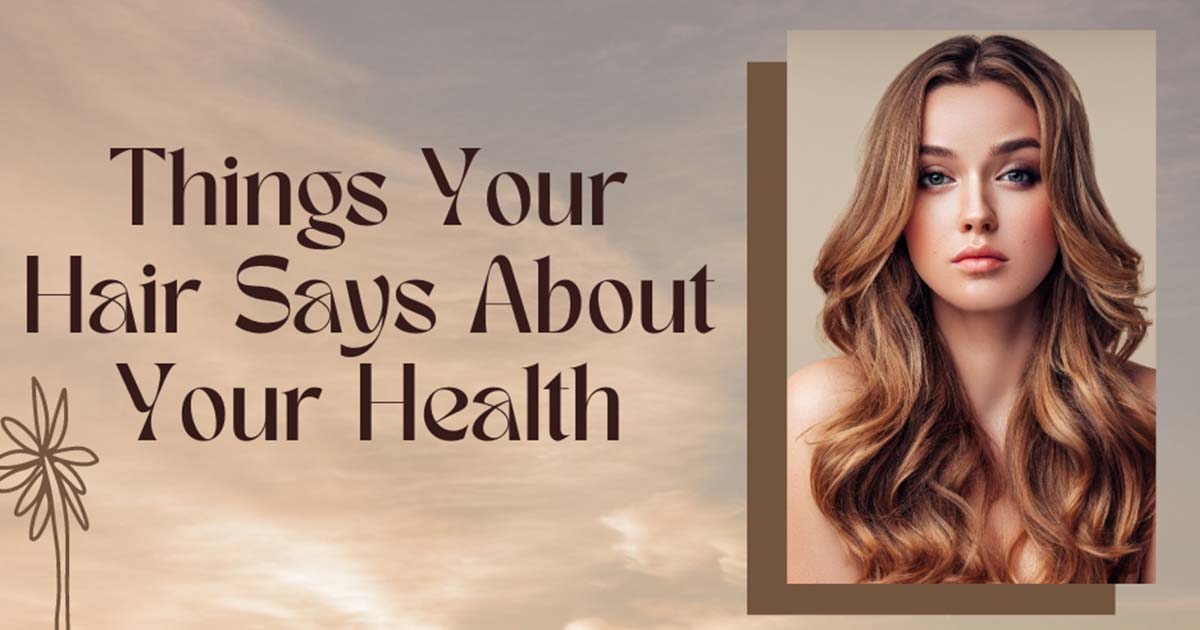Hair Says About Your Health Many women love having long hair for its feminine and seductive appeal, helping to slim down facial features while accentuating them. Furthermore, long hair helps keep heads and necks warm during cold weather months.
Did you know that hair can serve as an indicator of overall health? Here are seven things your locks could be telling you.
1. Dry Scalp
Your scalp naturally produces sebum to protect it against infections and microbes. However, when suffering from dry scalp syndrome, its protective layer breaks down and the flaky and itchy symptoms arise. It’s important to distinguish dandruff and dry scalp as these two conditions require different solutions; consult a dermatologist or doctor for help to properly identify which one you are dealing with and get treatment quickly.
Dandruff occurs when your scalp sheds dead skin cells at an increased rate, leading to itchy and flaky symptoms on your scalp. Flake sizes typically tend towards oily-sized while smaller, dry flakes indicate that you may have a dry scalp.
Your scalp may become dry for many reasons, including using products that strip its natural oils, ageing, genetics, climate and stress. But there’s no need to just accept it; both dandruff and dry scalp can be treated effectively! Try switching to gentle shampoo or adding in a scalp scrub like Drunk Elephant’s T.L.C. Happi Scalp Scrub ($36), which exfoliates while deeply moisturizing with marula and mongongo oils while exfoliating deeply for deeper hydration of both conditions.
2. Scalp Inflammation
Skin inflammation can often be easy to detect, whether in the form of breakouts and blemishes, redness due to rosacea or flakiness due to eczema, or flakiness caused by eczema. But when it comes to your scalp, signs of inflammation may be harder to pinpoint due to being covered by hair that obscures what’s going on below the surface.
Irritation and redness are the two hallmarks of scalp inflammation, both indicative of disease. Itching could be anything from dandruff or seborrheic dermatitis (which also can cause flaking), to an allergic or sensitive response to certain shampoos or products; redness could indicate psoriasis, or other conditions such as folliculitis.
Psoriasis can cause your scalp skin to thicken and scale off rapidly, with thick plaques formed as new cells move more quickly to the outermost layers of skin than usual. It may be brought on by genetics, stress, medications or an underlying health condition. While psoriasis may spread to other parts of the body such as legs or elbows – however this disease isn’t contagious! To combat scalp inflammation best avoid scratching as this will only irritate and worsen it further; instead use something gentle like No Guunk Fig Barbary Shampoo which will lift any build-up while soothing irritation from build-up and irritations in its tracks such as this!
3. Hair Thinning
Thinning hair could be a telltale sign of vitamin deficiency, hormone imbalance or anemia. You can help protect against this by limiting how often you wash and style your hair using low-heat tools as well as eating a diet rich in A and C-rich foods – also consider wearing a hat when going outside as UV rays can lead to additional hair thinning in women than men.
4. Hair Loss Prevention
Your body’s overall health can often be indicated by how your hair appears. If it has become dry, brittle, or thinned in any way it may be wise to alter both diet and lifestyle habits to stop further aggravating these conditions.
Even though some hair loss or abnormal growth is considered normal, if it persists beyond a temporary phase it could indicate an underlying health problem. If you observe any unusual or suspicious changes to your locks it’s wise to contact a physician as soon as possible and get their opinion; they will likely review your medical history, medication list, diet and hairdressing habits in order to pinpoint what might be causing any abnormal hair growth or loss.
Losing 100 hair strands per day after showering may be normal; however, excessive shedding could indicate more serious health concerns. Paradi Mirmirani, MD of Kaiser Permanente Vallejo California states that if excessive shedding persists, medical testing for thyroid disease, anemia and vitamin and mineral deficiencies is likely necessary; she suggests eating foods rich in proteins like eggs, chicken and dairy to support healthy hair.
5. Hair Thinning Prevention
Hair thinning is a normal part of aging, yet some individuals may experience it more than others. If you find that you are losing more than 100 hairs per day or have noticed bald spots, or more and more loose strands appear in your brush or on clothing; or more hair than usual in drains of sinks and tubs it may be time to consult a physician.
Though natural thinning cannot be reversed, there are steps you can take to delay or prevent it. Avoid placing too much strain on your hair through frequent shampooing sessions, using hot curlers/rollers/dyeing/bleaching services or tight braids which put too much strain on them as this may weaken and even break them down further, leading to dry, brittle locks.
Taken daily, multivitamins available over-the-counter can address nutritional deficiencies that cause thinning hair. Folic acid supplements, for example, may treat folate deficiency. Salmon, avocados, flax seeds, chia seeds and nuts are good ways to increase nutrient intake – these foods may even help protect follicles against hair loss! A healthy diet also plays a key role in protecting follicle growth and thus can prevent hair loss or thinning by providing essential nourishment necessary for growth.
Also Refer : Things To Know About Your Body’s Energy Levels
Source Image : unsplash.com, pixabay.com, freepik.com
